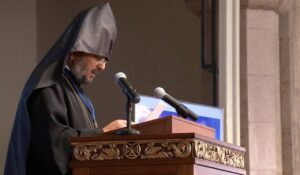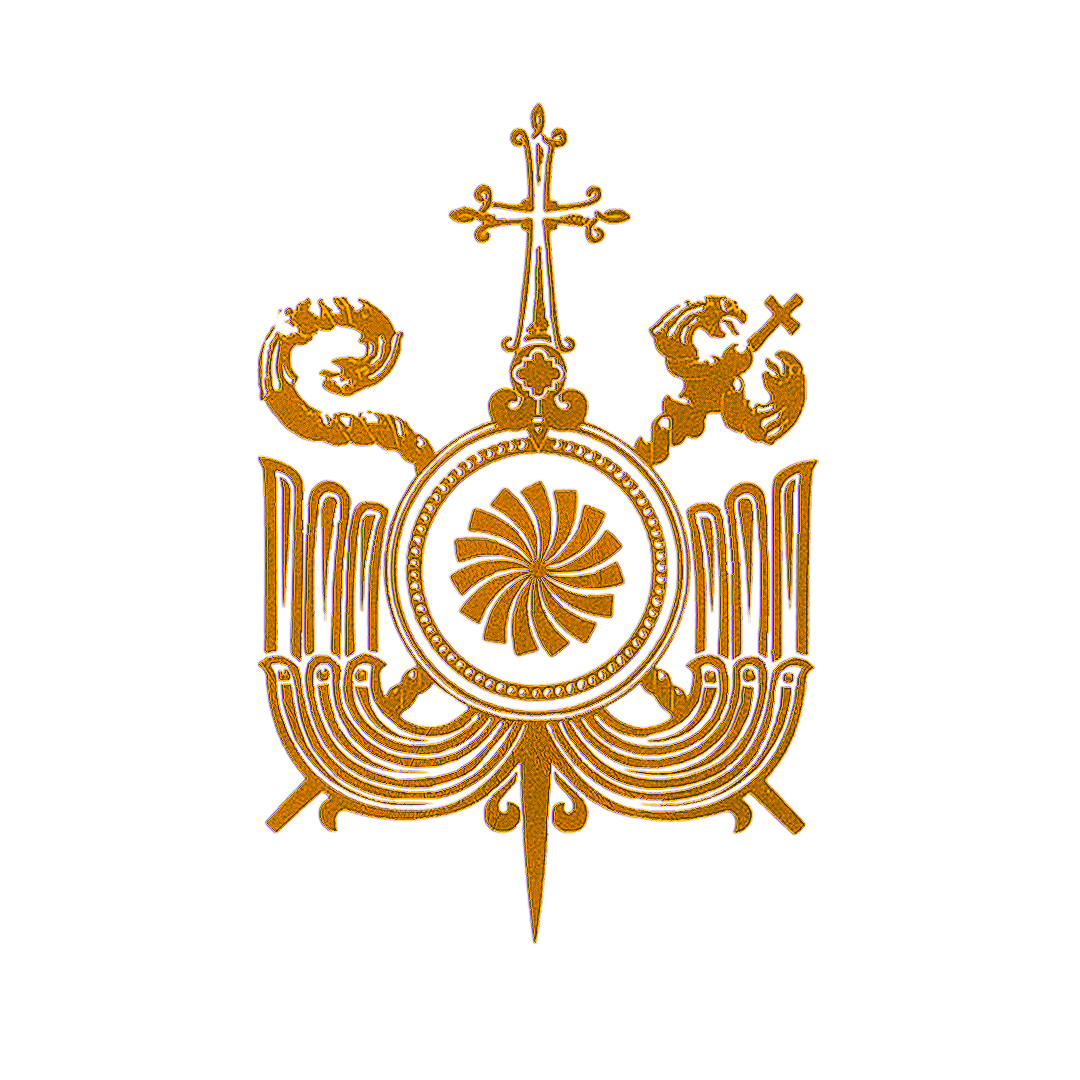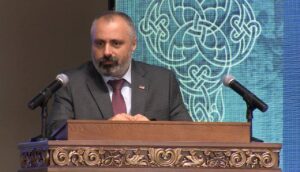"International Religious Freedom and Peace" in Echmiadzin
 On September 10, the Primate of the Artsakh Diocese Bishop Vrtanes Abrahamyan made a speech at the Conference "International Religious Freedom and Peace" in Echmiadzin. The head of the diocese spoke about the condition of the Artsakh diocese and the consequences of the war.
On September 10, the Primate of the Artsakh Diocese Bishop Vrtanes Abrahamyan made a speech at the Conference "International Religious Freedom and Peace" in Echmiadzin. The head of the diocese spoke about the condition of the Artsakh diocese and the consequences of the war.
"Your Holiness,
Honorable, reverend and worthy fathers, dear guests!
I welcome you all to the "International Religious Freedom and Peace" conference organized by the Artsakh Cultural Heritage Preservation Committee. Today, when the wounds of war are still bleeding, it is very important for all of us to bring the truth to the surface and fight courageously for it, so we hope that this conference will serve that purpose.
Religious freedom and peace. These are really extremely important issues, violations and destruction of which the Armenian people, especially the Armenians of Artsakh, have been experiencing for more than a century since the formation of Azerbaijan.
Christianity penetrated the territory of Artsakh and present-day Azerbaijan in the 5th century, when the grandson of St. Gregory the Illuminator Grigoris, went to Aghvank to spread a new religion. He became the first bishop of the Aghvan Church and gave his life for the fulfillment of this cherished mission. He was killed in 338 by order of King Sanatruk Arshakuni, and his body was buried in the Amaras monastery. Despite this, Christianity nevertheless spread in Aghvanka and became the state religion.
The Catholicosate of Aghvan was founded in 551, and its rulers were subordinate to the Armenian Catholicos. The new capital of Aghvanka, Partav, became the seat of the Catholicosate, and from the end of the 14th century, Gandzasar became the seat of the Aghvan Catholicosate. From that time on, it began to be called the Gandzasar Catholicosate, subordinate to the Armenian Catholicos of Echmiadzin.
Since 1836, in the regions of the former Catholicosate of Aghvan, two dioceses were created, subordinate to the Mother See. The first was the Artsakh diocese, and the second became the Shamakhi diocese (or Shirvan diocese). In 1915, there were 39 churches on the territory of modern Azerbaijan, 15 of which were in Shamakhi, 17 in Gokcha, 2 in Guba velayat and 5 in Baku.
The formation of the State of Azerbaijan became destructive for the entire region, and first of all for Artsakh. Considering that the Soviet authorities pursued an anti-church policy, then in Azerbaijan this was carried out with double force, in particular because of their genocidal nature, for centuries they tried to destroy everything connected with Armenia and its Faith. This behavior evolved over time through upbringing and, figuratively speaking, settled in their blood.
During the military aggression against the Republic of Artsakh in 1992-1994, the Azerbaijani authorities completely destroyed 167 Armenian churches and 8 monastic complexes.
After a 44-day war in 2020, 161 monasteries and churches of the Artsakh diocese came under the control of Azerbaijan. To say that they are in danger is to say nothing. The President of Azerbaijan is personally leading the horrific process of destruction or transformation of the Armenian spiritual and cultural heritage. Evident evidence of this is the shelling of the Gazanchetsots church and the blowing up of the Kanach Zham church in Shushi, the complete destruction of the Church of the Holy Mother of God in Mekhakavan, the erasure of the inscriptions of the church of St. The Mother of God in the village of Tsakuri, Hadrut region, by the hands of Aliyev himself, the presentation of the Dadivank and Gandzasar monasteries as Albanian ones and many other undisclosed facts.
A few days ago, we celebrated the 30th anniversary of the independence of Artsakh, the purpose of which was to restore the right of Artsakh Armenians to life and religious freedom. Yes, we have lost most of Artsakh, but the will of the Artsakh people for a free life is still alive. The Artsakh diocese, after many difficulties and invaluable losses, continues to remain faithful to its mission - to encourage our people with the Gospel of Christ in order to withstand the obvious blows of evil.
In this regard, I consider it necessary to mention that the Artsakh diocese has strong and heartfelt support in the person of the Catholicos of All Armenians Garegin II and our dioceses around the world, without which it would be very difficult for the diocese to work in the current conditions. The people of Artsakh and our spiritual heritage are under the special care of His Holiness, as evidenced by the fact that Dadivank was under the control of the Artsakh Diocese and the creation of the Committee for the Protection of the Spiritual and Cultural Heritage of Artsakh. Your Holiness, we express our deep gratitude for the fatherly concern.
Returning to the title of today's seminar, we must note with regret that officially the first Christian country in the world was left alone and defenseless in this region, surrounded by Muslim countries. If you look only through the prism of the Karabakh-Azerbaijani conflict and not delve into history, not a single international organization has taken practical steps to save the destroyed Christian pearls of Artsakh or prevent this behavior of Azerbaijan. At best, the facts were recorded and alarmed statements were made.
Therefore, we pray and wish that this conference will bring practical results, become a small mustard seed that will unite Christians around the world around the ideas of protecting Christian values and respect for religious freedom in general. The Christian world now has to choose whether it will wash its hands, like Pilate and silently take part in the crucifixion of Christ, or boldly take the side of the Righteous. "
Artsakh Republic Foreign Minister David Babayan also took part in the conference.
David Babayan presented issues related to the situation created by the war, the destruction by Azerbaijan of the Armenian historical and cultural heritage in the occupied territories, as well as recent regional events.
The minister stressed that the Azerbaijani-Karabakh conflict and the unleashed aggression against Artsakh cannot be regarded as an interreligious clash, stressing that terrorists and extremists do not belong to any religion.
In this context, the Foreign Minister highly appreciated the interreligious dialogue, considering it one of the most effective means of peaceful settlement of conflicts, extremism and xenophobia, and highly appreciated the role of the Catholicos of All Armenians and the Armenian Apostolic Church in this process.




